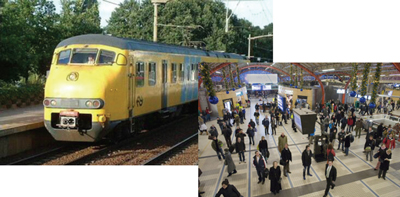While societal logistics (SL) affects our everyday life, it tends to receive attention only when things go wrong. For example, many ambulance service providers fail to provide an optimal service in emergencies due to inefficient personnel planning. Many healthcare organizations suffer from excessively long waiting lists due to improper planning of healthcare professionals, so that patients in severe need may face lengthy delays before they receive care. Many railroad-scheduling systems are based on outdated planning techniques and are overly sensitive to minor disturbances, causing unnecessarily long waiting times during rush hour. Many highroads in urban areas are overly congested during rush hour due to inefficient use of the available capacity of highways. Many helpdesks at customer service centres suffer from inefficient planning of agents and are under-staffed, causing long waiting times for customers. These are just some examples of situations where under-performing societal processes influence our daily life.
Consider for example capacity planning for trains: during rush hour, trains in urban areas may be overly full and many passengers are forced to go without a seat. The obvious solution is simply to make the trains longer by adding carriages. In practice however, this does not work. Rather than being simple off-the-shelf products, train carriages are very expensive and may take years to order and manufacture. Hence, the addition of carriages needs to be planned years in advance, and is not a short-term solution. A smart way to overcome short-term capacity problems in trains is to couple and decouple carriages to provide additional capacity when really needed, distributing capacity in such a way that it is available at the right time and the right place. In this context, the challenge is to design efficient scheduling algorithms for how and when to couple and decouple carriages.
At first glance, a simple solution seems to be to consider all possible train schedules, including all possible coupling/decoupling combinations. However, the number of possible schedules is virtually unbounded, and practice it may take years of computation time to identify the best schedule, even with the fastest available computers.

The phenomenon of a fast-growing number of possibilities commonly occurs in solving planning problems. This raises great scientific challenges: how to identify algorithms that determine an efficient schedule within a reasonable time frame? This area of expertise requires in-depth knowledge from both mathematics and computer science. To solve this complex problem, one may represent the set of possible schedules as for example a set of data points in a virtual and highly dimensional space. This representation provides an understanding of the problem and an intuition for how the optimal schedule should look. Based on this type of fundamental in-depth mathematical approach, software can be implemented to efficiently schedule the distribution of carriages for railway service providers.
In many societal application areas, the economic relevance of the proper planning of logistic processes can be easily demonstrated and quantified in terms of increased revenue or cost savings. However, in practice there is often some reluctance to implement new planning tools and techniques. Nonetheless, in our experience the importance and usefulness of proper planning for scarce resources is starting to gain wider acceptance. For example, an increasing number of healthcare service providers are starting to realize the importance of healthcare logistics, and are adopting advanced planning tools and showing great improvements in efficiency. Railroad service providers are adopting advanced scheduling algorithms. We also observe growing interest from customer context centres in improving their efficiency by implementing state-of-the-art workforce planning tools, and many ICT service providers are adopting advanced capacity planning tools.
In short, societal logistics is an exciting and promising new research area of growing societal interest. It requires a multidisciplinary approach, combining the expertise of different sub-areas within mathematics and computer science. Together with research themes in the earth and life sciences, 'software as service' and the data-explosion, societal logistics is one of the focus areas at CWI.
Link:
http://www.cwi.nl/
Please contact:
Rob van der Mei
CWI, The Netherlands
E-mail: mei![]() cwi.nl
cwi.nl









